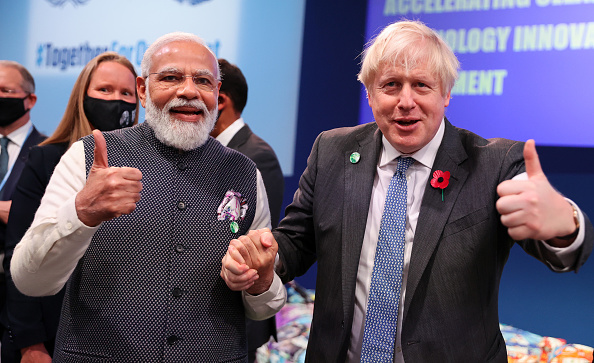Exclusive: Food safety concerns spark cabinet row over UK-India trade deal

Ruptures have once again emerged across government over the direction of the UK’s post-Brexit trade policy, with environment secretary George Eustice raising concerns about a potential deal with India.
Whitehall sources told City A.M. that India’s food safety standards have been a cause for concern for Eustice and the Department for Environment, Food and Rural Affairs (Defra) as the UK looks to seal a zero-tariff trade deal with the world’s largest democracy.
A senior Department for International Trade source said momentum on the UK-India trade deal has “slowed down” and that it is unlikely a quick deal will be struck with Narendra Modi’s government.
The UK and India are set to begin trade negotiations over a post-Brexit deal in early 2022, after originally planning to start them this year, with international trade secretary Anne Marie-Trevelyan underscoring the importance of the negotiations in a speech last week.
India will want the British government to slash tariffs on meat and food products sent to the Britain, while the UK is looking to secure better access to Indian markets for City financial services firms.
Trevelyan and her team also want Modi’s government to slash the 150 per cent tariff India has on Scotch whisky imports.
Eustice previously raised concerns over the Australia trade deal, which will see the UK remove all tariffs on Aussie agricultural goods over the next 15 years, and has similar worries about a potential India deal.
The National Farmers’ Union (NFU) chief international trade adviser Gail Soutar said any trade deal with Modi must “ensure that UK farmers and growers are not undercut by food imports that have been producing using methods and inputs that are illegal here”.
India has been criticised in the past for their heavy use of pesticides in food production, which was one of several reasons trade negotiations between India and the EU stalled after seven rounds of negotiations.
“George is certainly in favour of free trade, but he has expressed concerns about India’s food safety standards and how they would affect a trade deal,” a senior Department of International trade source said.
A source close to Trevelyan said the UK would never water down food safety standards in any trade deal, while a government spokesperson denied there had been a cabinet row over the scope of negotiations.
Dr Gareth Price, Asia Pacific expert at the Chatham House think tank, said India has “really lax rules on pesticides and the ones they use are quite strong”.
He added that negotiations will be difficult with Modi as he has not shown a willingness in the past to open up his economy to international services firms – a key UK ask.
“The problem for the UK is that the kinds of things the UK does best aren’t the type of things that India have showed they’re interested in – financial services and legal services are closed off over there,” he said.
A government spokesperson said: “Both DIT and Defra continue to work in lockstep to support British farmers and food and drink exporters. As we have continually stated, maintaining the UK’s high standards, including for food safety, remains a red line in all our trade negotiations.”
Defra was contacted for comment.